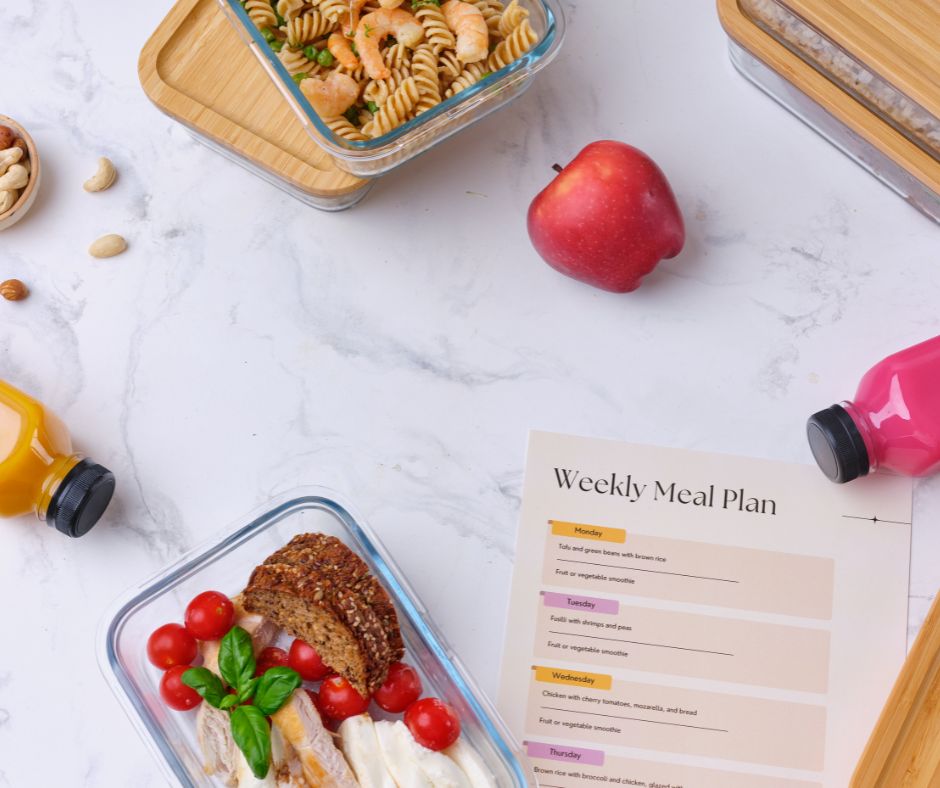Expert Tips for Weight Loss That Actually Work
Weight loss can often feel like an uphill battle, especially with so much conflicting information and fad diets out there. The truth is, sustainable weight loss isn’t about quick fixes or extreme restrictions. It’s about making simple, realistic changes that fit into your life.
I know how overwhelming it can be to figure out where to start, but you don’t have to do it alone. Here are my nutritionist, science-backed, tips that can help you lose weight in a healthy, balanced way, without feeling deprived or stressed.

Understanding Weight Loss
The Science Behind Weight Loss
At its core, weight loss is about creating a calorie deficit—burning more calories than you consume. This can be achieved through a combination of regular physical activity and making smarter food choices. However, the way each individual loses weight can vary based on metabolism, genetics, and lifestyle. It’s not just about cutting calories, but also ensuring your body is getting the nutrients it needs to function efficiently.
Importance of a Healthy Lifestyle
A holistic approach to weight loss involves more than just counting calories or following a restrictive diet. True success comes from maintaining a well-rounded healthy lifestyle—this includes balanced nutrition, regular exercise, quality sleep, and managing stress. Building sustainable habits, rather than short-term fixes, ensures long-term success and better health.
Setting Realistic Goals
How to Set Attainable Weight Loss Goals
One of the biggest mistakes people make is setting unrealistic expectations. Instead of aiming to lose a significant amount of weight quickly, break it down into smaller, achievable targets. A healthy rate of weight loss is about 1-2 pounds per week. Focus on consistent progress, not perfection.
Tracking Progress Effectively
Tracking your food intake, exercise, and body measurements can provide valuable insights. Use a food diary or apps to monitor what you eat and how much you move. This not only helps with accountability but also shows your progress beyond the scale—such as increased energy or improved mood.
Effective Weight Loss Strategies
Incorporating Physical Activity
Exercise plays a key role in weight loss by burning calories and boosting your metabolism. However, it’s important to find activities you enjoy. This makes it easier to stay consistent, turning exercise from a chore into a habit.
Types of Exercises for Weight Loss
Cardio exercises like running, walking, or cycling are effective for burning calories, while strength training helps build muscle. A combination of the two is ideal, as building muscle boosts your resting metabolic rate, allowing you to burn more calories even when you’re not working out.
Benefits of Strength Training
Muscle burns more calories than fat, even at rest. Incorporating strength training into your routine not only tones your body but also helps you maintain muscle mass as you lose weight, which is essential for long-term success.
Nutritional Tips for Weight Loss
Importance of a Balanced Diet
Nutrition is key to weight loss. Focus on eating whole, minimally processed foods that are rich in nutrients, such as fruits, vegetables, lean proteins, and whole grains. Avoid highly processed foods that are often high in added sugars, fats, and calories but low in nutritional value.
Meal Planning and Preparation
Planning your meals in advance makes it easier to stick to your goals. Spend time each week prepping healthy meals and snacks so that you always have something nutritious on hand. This can prevent last-minute unhealthy food choices.
Mindful Eating Practices
Mindful eating involves being fully present during your meals—focusing on the food, savouring every bite, and recognising when you’re full. This practice not only enhances your relationship with food but also helps prevent overeating.
Listening to Your Body
Learning to listen to your body’s hunger and fullness cues is a powerful tool for weight loss. By slowing down and paying attention to your body, you’re more likely to eat just what you need, rather than overeating.
Importance of Portion Control
Even healthy foods can contribute to weight gain if consumed in large amounts. Pay attention to portion sizes—this doesn’t mean you have to weigh every meal, but being mindful of how much you’re eating can make a significant difference.
Staying Motivated on Your Weight Loss Journey
Finding Support Systems
Staying motivated can be tough, especially when the initial excitement of starting a new routine wears off. Surrounding yourself with support—whether it’s family, friends, or a community—can help keep you accountable and motivated.
Benefits of Joining a Weight Loss Group
Support groups provide a sense of community and accountability. Many people find that sharing their experiences and challenges with others who are on a similar journey helps them stay on track and motivated.
Utilizing Social Media for Motivation
Social media can be a powerful tool for finding motivation and inspiration. Following fitness accounts, joining online groups, or participating in challenges can give you a sense of accountability, even from afar.
Celebrating Small Wins
Weight loss is a marathon, not a sprint. It’s important to celebrate the small milestones along the way, whether that’s losing a few pounds, eating more vegetables, or simply feeling more energetic. These wins help build momentum and keep you motivated.
Overcoming Common Weight Loss Challenges
Dealing with Plateaus
Weight loss plateaus are common and can be frustrating. When progress slows, it might be time to reassess your calorie intake, switch up your exercise routine, or simply be patient as your body adjusts. Plateaus don’t mean failure; they’re a normal part of the process.
Navigating Social Situations
Social events can be a minefield when trying to lose weight. Plan ahead by eating a small meal before attending a gathering, or simply choose healthier options. Remember, it’s okay to enjoy yourself occasionally, as long as you get back on track afterward.
Bottom Line
Losing weight effectively isn’t about quick fixes—it’s about making sustainable lifestyle changes. Whether it’s eating more mindfully, incorporating strength training, or finding a supportive community, these strategies provide a solid foundation for lasting results.
Remember, weight loss is a journey, not a destination. Stay patient, stay consistent, and keep celebrating your progress, no matter how small. You’re capable of achieving your goals, one step at a time.
I am currently taking on new clients, if you want to find out how I can help you: Email hello@nutri-sian.co.uk or book a FREE call to discuss more here.
You might also like …
The Calorie Lie: Why Your Hormones, Not Willpower, Control Hunger
Still Counting Calories? The Real Reason Your Hunger & Weight are Stuck (It’s Not What You Think) Are you a busy…
5 Reasons Why Stress Sabotages Your Weight Loss Efforts
How stress impacts your weight and what you can do to help. Feeling constantly tired, craving sugar, and noticing stubborn belly…
Unlock More Energy With Better Gut Health
Why Your Gut Might Be the Missing Link in How You Feel You’re juggling a million things—work deadlines, family logistics, hormonal ups…
The Best Brain-Boosting Foods for Focus and Clarity
The Best Brain-Boosting Foods for Focus and Clarity Do you ever find yourself struggling to focus during a busy day, forgetting…
7 Quick and Powerful Mood Boosters for Busy, Stressful Workdays
Quick Ways to Boost Your Mood Naturally During a Busy Day When was the last time you felt truly energised during…
What to eat when you have no time to cook
What to Eat When You Have No Time, Energy & Motivation Feeling shattered and unmotivated? After a busy, long day you…






